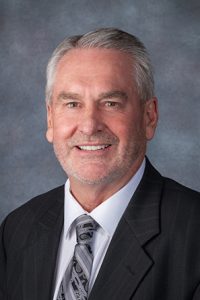Restrictions on conservation, preservation easements considered
A proposal to change provisions relating to conservation and preservation easements in Nebraska was heard by the Judiciary Committee Feb. 11.

A conservation easement is a voluntary, legal agreement that permanently limits land use for conservation purposes. Preservation easements do the same for historic purposes.
Under LB1135, introduced by Glenvil Sen. Dave Murman, the register of deeds would require approval from the appropriate governing body prior to recording a conservation or preservation easement. For property that is fully or partially located within a city or village, that body is the local planning commission. For property outside a city or village, the appropriate governing body is the county board. The Niobrara Council has jurisdiction over property in the Niobrara scenic river corridor.
A landowner wishing to extend the duration of an easement could do so only with approval from the appropriate governing entity under the bill. If property on an easement is condemned for public use, the easement would be terminated and easements would be subject to property taxes.
The bill also would increase the amount of time the planning commission would have to provide comments to the governing body from 60 days to 90 days. If no comments are provided, the proposed easement would be denied.
Additionally, under LB1135, an easement could not exceed 99 years.
Forever is a long time, Murman said, and the state shouldn’t bind future generations to conservation decisions that may once have seemed right but no longer make sense.
“The acquisition of Nebraska land by the federal government could shift more of the property tax burden to fix bridges, repair roads and fund schools to current landowners and cause additional budgetary problems for local governments,” Murman said. “Setting aside so much for conservation [could] devastate food production and Nebraska’s economy.”
Tanya Storer, Cherry County commissioner, spoke in favor of the bill. While it’s true that a conservation easement would protect family farms and ranches for the first generation, Storer said, the second generation [landowner] would not be eligible for any financial benefit for their conservation practices.
“Perpetual conservation easements create a negative servitude which places the holder of the deeded property in a subservient position to the easement holder,” Storer said. “Perpetuity says to our youth, ‘we don’t trust you.’ It takes the freedom and the decision-making away from the living and it buries it with the dead.”
Trent Loos of Hazard also testified in support of LB1135. Collectively, the federal and state governments own 33 percent of the United States’ land mass, he said.
“This is a matter of national security. We have people who do not live on this land and do not care for this land who are trying to determine how we care for this land,” Loos said.
Dale Schroeder spoke on behalf of the Keith County Board of Commissioners in support of the bill.
“Our state relies on agriculture and if we continue to allow the removal of lands by preservation or conservation easements in perpetuity … we will also reduce the income as provided by [agriculture] in Nebraska,” he said.
Debbie Borg, a fifth-generation farmer, also spoke in favor of the bill. She said LB1135 would provide an avenue to ensure local control and oversight for private landowners.
“We must keep property in private hands. Families, farmers, ranchers – stewards of the land, landowners – care deeply about their soil and water,” Borg said. “Property rights are a fundamental freedom.”
In opposition to the bill was John Denton, representing Ducks Unlimited. Restricting conservation easements infringes on the private property rights of landowners, he said. Permanent decisions involving development, drainage, power lines and gas are made all the time, Denton added.
“In a landscape where over 95 percent of land is privately owned, these agreements have been critical to providing wildlife habitat,” Denton said.
Kimberly Stuhr spoke in opposition to the bill on behalf of Friends of the Niobrara. Thirty-three thousand people floated on the Niobrara River last year, she said, and ranch families who want to [maintain their easement] while choosing to voluntarily safeguard the health of the river should be allowed to do so.
“Perpetual conservation and agricultural easements are truly the only way to protect unique and beautiful resources like the Niobrara [river],” Stuhr said. “In many ways, you could say that they would protect the history and legacy of the state.”
Kristal Stoner, executive director of Audubon Nebraska, also testified in opposition. Stoner said that less than 1 percent of Nebraska is under an easement. The best aspect of a conservation easement, she said, is that it remains in the hands of private landowners.
“An easement is a smart investment and the benefits stretch beyond just those individual landowners that choose them,” Stoner said. “Easements can be designed to ensure the grasslands remain intact and do so in a manner that serves both cattle and birds. They can also serve wetlands that filter our drinking water and support waterfowl migrations and waterfowl hunters.”
The committee took no immediate action on LB1135.

